by Allison Phillips | Oct 26, 2012 | COBA Events, Current Students
Homecoming is an integral part of the college cultural, and in this regard, ACU is no different from other universities. Like other colleges, ACU homecoming includes parades, shows, meals, and football. However, because ACU is a small, tightly knit community, it seems that at ACU, homecoming is different.
I think it’s possible that this difference is a result of our faith; after all, it is only when we gaze through the lens of faith that we discover what “home” truly is.
This past weekend alumni from all over the world traveled to Abilene to celebrate the university that has helped make them into who they are today. For a couple days, it seemed that everyone in town was either related or a friend of a friend. Sure, there was hype and pep, but underneath all of the excitement was something deeper, something more substantial. The people being reunited weren’t being reunited over a shared love of something flighty or petty. They were being reunited over something visceral, something that defines them as human beings.
Students often hear that friendships made at ACU last a lifetime. Here’s what one ACU College of Business alumnus, Kevin Roberts (’88), has to say about those relationships and what ACU homecoming means to him:
“Homecoming…Coming Home. It is strange how much it feels like returning to ACU is in fact coming home. As a freshman in 1984, there would have been no way that you could have convinced me that this place would ever be special, much less “home.” However, that is what it became. The memories and relationships forged on this campus have lasted decades.
Even though I work at ACU now and am here everyday, there is still a flood of nostalgia as I walk across campus. I remember moments that were funny and moments that were poignant. I remember lessons learned and ideas awakened. Most of all though, I remember people. It is these memories that make homecoming so special. It provides a chance for the ghosts of my memory to come alive. The people that I love so dearly, that shaped my lives so profoundly, all come back home. We get to laugh together and pray together. We get to brag on our kids and tell of our plans. Most of all though, we get to remember. We get to remember how special a place ACU is to all of us. It is special not just because of the education we received. It is special because of the relationships we formed that give us a glimpse into the community that God intended his people to live in. I am ready for all our family to come home.”
Whether or not you were able to be a part of ACU’s homecoming festivities this weekend, I hope that you will take time today to reconnect with old friends and to see how they have grown and changed. Find out how God is working in their lives.
After all, it is only in the presence of God that we will ever truly be home.

COBA Alumnus Donnie Clary ('82) celebrates homecoming with his daughter, current COBA student Amanda Clary ('14) and his wife, ACU Alumnus Tami Clary
by Amanda Pittman | Jan 27, 2012 | COBA Events, Current Students, Special Speakers, Springboard
If you have ever taken the time to sit down and jot out a plan for starting your own business, you need to enter our Springboard Ideas Challenge. If you ever even just thought about a cool idea for a business or service, you need to enter our Springboard Ideas Challenge. You never know! YOU could win $10,000! There’s even a high school category for competition this year. Click here for more information about the competition, divisions, awards and prizes.
Registration is now open for our fifth annual Springboard Ideas Challenge!
Don’t worry if you don’t know how to write a business plan, there are training sessions scheduled to help you learn!
Also, mark your calendars for Tuesday, April 17th for the Springboard Ideas Challenge Awards Dinner. We’re honored to welcome William (Bill) E. Greehey, former Chairman and CEO of Valero, as our guest speaker. Click here to learn more about Mr. Greehey. He now serves as Chairman of the Board for NuStar Energy L.P. and is an active philanthropic patron in the San Antonio area.
We hope you can join us during this exciting Springboard season.
by Amanda Pittman | Jan 19, 2012 | Careers In..., COBA Events, College Decisions, Current Students, Special Speakers
After being pushed from the fall, due to their appearance in the World Series, we are thrilled to welcome the CFO of the Texas Rangers, Kellie Fischer, to our campus on Feb. 7th.

Here’s Kellie’s bio, from the Rangers website:
Kellie Fischer was appointed Chief Financial Officer of the Texas Rangers in March of 2005. She oversees all financial matters, human resources, information technology and legal operations for the Texas Rangers. Kellie joined the Rangers in 1999 and has served in many roles for the Rangers former parent company, Southwest Sports Group and the Dallas Stars.
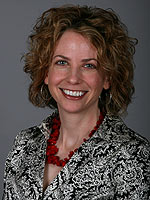
We're excited to welcome Mrs. Fischer to our campus this semester
Prior to joining the Rangers, Kellie spent four years at PricewaterhouseCoopers LLP in the audit division of the Dallas office. She earned her B.A. in accounting from Baylor University in 1995 and is a Texas CPA. Kellie serves on the Executive Board of Directors for the Arlington Chamber of Commerce, the Board of Directors for the Texas Rangers Baseball Foundation, the YMCA of Metropolitan Dallas, and the Baylor Hankamer School of Business Advisory Board. In addition, Kellie recently served on the Baylor Accounting Department Advisory Board.
In October 2010, Kellie was awarded Chief Financial Officer of the year for private mid-size companies by the Dallas Business Journal.
Kellie and her husband Scott reside in Dallas and are active in promoting cancer awareness for the American Cancer Society Relay for Life.
The luncheon event, where Mrs. Fischer will be speaking, is free and only open to ACU students and faculty. For more information, click here.
by Amanda Pittman | Dec 6, 2011 | COBA Events, Current Students, Faith Infusion, Special Speakers
We are excited to share with you a bit about one of our Leadership Summit 2012 speakers. Jose Zeilstra was featured in a Fortune article back in July of 2001 (just two short months before 9/11) titled ‘God & Business: Bringing spirituality in the workplace violates the old idea that faith and fortune don’t mix. But a groundswell of believers is breeching the last taboo in corporate America’. (article written by Marc Gunther from Fortune magazine’s July 2001 issue; cited from CNNMoney’s website.)
Not only will Zeilstra be sharing about having faith in the marketplace with our students at Summit, she’ll also be sharing about her experiences as a survivor of Tower I on September 11, 2001. We are honored to have Jose Zeilstra as a guest speaker at our Leadership Summit 2012 this coming January.
Stay tuned for more Leadership Summit speaker spotlights and updates from Summit coming in January.
by Amanda Pittman | Nov 14, 2011 | COBA Events, College Decisions, Current Students, Distinguished Speakers Series, Faith Infusion, Special Speakers
On Thursday, Nov. 3rd, the ACU community had a unique opportunity to hear from the President and CEO of AFC Enterprises, Inc., the parent company of Popeye’s Louisiana Kitchen. Cheryl Bachelder is many things – a mom, a wife, a female, a successful CEO, a brand manager, a gifted speaker and teacher.

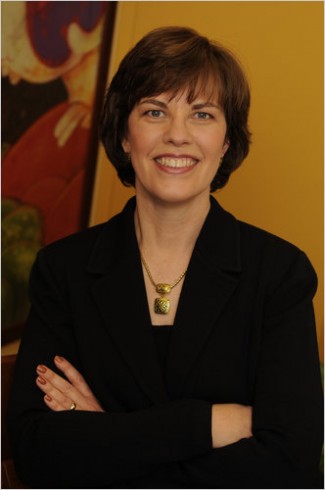
Cheryl Bachelder, President of Popeye's and CEO of AFC Enterprises, Inc.
Mrs. Bachelder guest lectured in our 9:30am Consumer Behavior class. EJ Johnson is a senior marketing major from Frisco. He said, “I truly enjoyed the class with Mrs. Bachelder today! Her work hits close to home as I am a Louisiana Creole and run the largest social media organization for Louisiana Creoles in the nation.” Bachelder spoke about the rebranding of Popeye’s and how she is leading the company by helping find its ‘true north’ – going back to the company’s roots and the things that made the food unique and special.
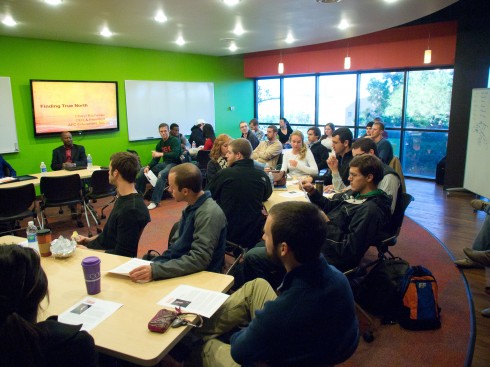
Consumer Behavior students listen to guest lecturer and Distinguished Speaker Cheryl Bachelder
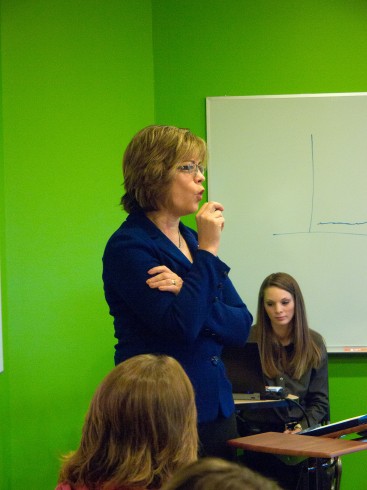
Bachelder teaching
After the class, Bachelder addressed an audience of over 300 at our 2011 Distinguished Speaker Series luncheon in the Hunter Welcome Center. After discussing the how the brand has performed over the last three years (world’s second largest quick service chicken concept based on the number of units) and is expanding rapidly overseas, Bachelder discussed how character, competence and motive are essential traits in successfully leading in the marketplace. She challenged the audience to lead by serving – and to evaluate and define their purpose and principles.
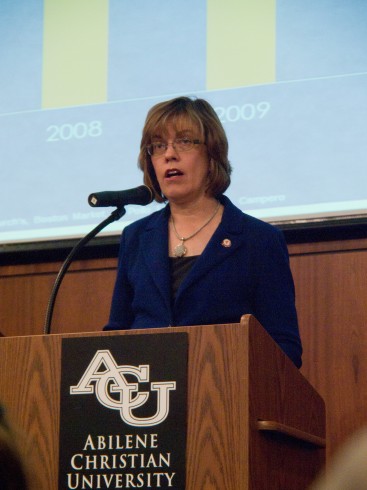
Bachelder speaking at Distinguished Speakers Series luncheon
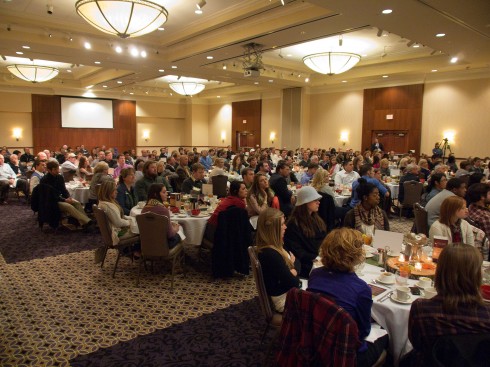
At the conclusion of her talk, Bachelder answered questions that were submitted via text messaging. We received a large number of questions and she was only able to answer about 3 or 4 before we had to wrap up the luncheon event. We emailed her the remaining questions and she’s provided her responses below:
> As I hear you stressing the importance of having leaders with right motives and character, what strategies would you recommend for a future college grad to use when looking to work for a company with leaders that uphold these qualities?
I would encourage you to find out all you can about the leader of the team or department you would be working for. What is their leadership style? Is it driven by personal ambition or by ambition for the enterprise? What values can you detect? How do they treat people? What adjectives do people use to describe them? What are their interests/passions outside of work? Are they direct, candid, transparent? Are they willing to admit mistakes or expose vulnerability? If the company has a vision, mission, and/or values statement…ask them how they would explain it. Is it a plaque or does it have real meaning to the individual? I would also investigate the CEO of the company….read every article about them and explore what they mean to purpose and principles. The top leader sets the direction and sets the cultural norms. If you find concerns in the top leader, they will likely result in dysfunction somewhere in the enterprise. And conversely, if the top leader has a positive leadership motive, you can expect that will positively influence decisions that are made in the company.
> Can you elaborate on the Isaiah verse about grasshoppers? In what ways are we like grasshoppers?
New International Version (©1984) “He sits enthroned above the circle of the earth, and its people are like grasshoppers.” Isaiah 40:22a. I lean into this verse as a constant reminder of my humble role in God’s kingdom. The Creator of the universe is so much greater than I. I am merely one of his “grasshoppers.” I intend to be the very best grasshopper I can be, but I don’t want to lose sight of the fact, that God’s plan is far more encompassing and huge than any plan my small mind could think up. So for me, grasshopper= humility.
> How do you incorporate Christian values into a publicly held company? Legally…
I believe all leaders, with faith or not, bring their values into the workplace…so values are something we can and should discuss in the workplace. To work together effectively, we must know one another well. This requires time invested in building relationships with people and treating people with care and respect. If people know you well and believe that the work environment is a healthy one of candid conversations, they become open to values conversations. There is nothing illegal about discussing values like honesty, respect, and accountability. In fact, these conversations are essential…values conflicts will hurt the performance of the team.
For sharing faith, I have found the best approach is to live out your faith in your day to day actions. People will then see something special and genuine about you, and they will want to know more about it. If you are a content person, because of the peace you have found in faith, you will stand out from other discontented, anxious people. You will be asked where your peace comes from. If you have experienced trials and shared them with people, they will learn how you coped with those trials. They will be interested in hearing your story, including your faith lessons.
But importantly, no one will be open to hearing about your beliefs, if you have not invested in building an authentic friendship with them over time. Only in the safety of this relationship, do you have the opportunity to share your perspective and impact lives. Focus on building relationships, and this will bring forward the God-given opportunities to share your faith with others.
> How much of a role does technology play in your business? How do you leverage new technologies, such as iphones or ipads?
Technology plays a role, but perhaps not as large a role as other businesses. We use technology to track and analyze our business. We use sophisticated point of sale terminals that collect data on every purchase in a restaurant and allow us to analyze results and opportunities for improvements. We now use “cloud” type web solutions for collecting data and analyzing it, because it is cost-effective to do so. We have tools that allow us to track restaurant video cameras 24/7 on our ipads so that we can see what is going on at any time. And of course, like you, we communicate 24/7 with our PDAs…email and text. That allows us to work constantly, even on vacationJ.
> What was your best learning experience at a former employer that you have used at Popeye’s?
There are three learning experiences that I have applied at Popeyes.
1) ROADMAP: The leader must express a very clear picture of where the company is headed. We call that our roadmap for results. It gives the goal and the strategy we must pursue to be successful in our industry. We talk about these four goals and four strategies at every single communication opportunity so that the “destination” becomes well understood….and all people can contribute.
2) SUCCEED: The leader must be tenacious about helping the organization reach the goals, the destination. Failure is not an option. A winning team has to win. The leader has a responsibility to competently lead the people to successful performance, and to stop them from doing things that could interfere with getting to the goals. Without succeeding, the leader has let down the organization. Competence is a character trait.
3) ENVIRONMENT: The leader must create a healthy environment for people to grow and develop. It must be an environment of high trust, constructive conflict, candid communication, sincere concern for people. Without these traits, the environment is “toxic” to people; they do not thrive; they do not advance and grow, and eventually that holds back the capability of the company.
> Could you tell us what kind of challenges you face as a female CEO in a big company such as Popeye’s?
The challenges I face are fewer than you might think. But that reflects the fact that I chose this company (and this industry) because it is a good place for women to develop and lead. My Board is very supportive of my leadership and I believe they value and respect my contributions. My shareholders have focused on my results, and appear indifferent to my gender. My team members and franchisees have been open to my leadership, and over time, I believe have gotten to know me well and respect my approach.
Occasionally, there is a truly funny event. Like the time I went to Japan to help negotiate an acquisition. The Japanese executives assumed that I was at the meeting to take notes, so they offered me a lovely gift of writing pens with perfume in them. My team found this amusing, but I accepted the gift, and we moved on without incident.
Are their awkward times as a female CEO? Yes. People are often uncomfortable around me at first. They probably don’t know what to expect. They may have some assumptions about how female leaders lead. They may assume that I am unmarried and have no children. They may assume I do not have faith in God. So I make it my mission to reach out first with a warm, approachable conversation. I often share personal stories about my family as an ice breaker. I often hold back announcing my “title” until asked or after we’ve established rapport. It is still very unusual in our culture to be a female CEO. There are only four female chain restaurant CEOs. So I think that means I have to help people get past that first awkward moment.
> How has female leadership changed/improved the enterprise?
I do believe women are created differently than men, and that is a good thing. Women, as a group, have strong relationship skills. They are sensitive to people’s needs and are often, very responsive and caring. This contributes to a healthy workplace where people are valued and treated well. Women are often more candid and transparent in business discussions. They cut to the chase. They are less guarded. This contributes to a more open dialog of the real issues, and it saves time. Women often have strong business instincts that deserve further exploration. This more intuitive thinking leads to more creativity around innovation and problem solving. Lastly, I’ve noticed that women juggle many tasks well, and as such, they are often highly productive and help others figure out how to juggle as well. These are broad generalizations, but my experience has been that teams with a blend of men and women perform particularly well. Gallup research supports this. They found teams that were 50/50 male/female outperformed teams that skewed either male or female.
> What is the best way to get people on board to help you start up and fund your business plan?
The first thing is to have a thorough, thoughtful and complete business plan. I’m amazed at how many business proposals I have been given that were thinly prepared. No one will invest in something that they do not understand or that they cannot see a path towards performance results. When developing a business plan, take it in “draft” form to many experienced business people and ask them what you are missing. Asking for feedback, then filling the gaps will results in a much stronger presentation for your potential investors. The second recommendation is to have some “proof of concept.” You need some data that supports your premise. If you want to own a restaurant, you may want to cater for a few months to demonstrate that people love your food and service…and it generates repeat customers. As the saying goes, “the proof is in the pudding.”
> If the most competent people in your business lack good character, what should you do as a servant leader?
The first step is to be sure you have set crystal clear expectations for character traits and that you have given the leader an opportunity to adjust to these new expectations. You will know by how much effort the individual takes to change their own behavior. If they make significant effort, and the team is noticing progress, you can afford to give them more time. If they do not make effort and it is obvious to the team that they do not share the character traits, you must confront the situation. This person, left in place, will essentially message to your organization that the character traits really don’t matter, or else this person would not be allowed to continue. This is a cancer on the team and will hold back their performance.
One caveat:, I am constantly amazed at how many people have been “trained” by leaders without strong character traits. The result is that a person shuts down their own character traits and operates at work by the leader’s “rules.” They do not share the leader’s values, but they fear that they must simply conform or be fired. Therefore, you must assure your employees that your character traits are genuinely desired and that they are in a safe environment to become more authentic in their actions. By seeing this situation, I have been able to turnaround a few of these situations.
> How did you change the environment without being another flavor of the month?
Good question. I think many people DID view me as “flavor of the month” when I came to Popeyes. I was the seventh CEO in about 10 years. What else would they think? This made it very important for me to act with consistency in everything that I did, so that over time, trust would build.
I think that our business culture and financial markets have allowed this short term, flip-the-leader environment to develop and it is not healthy for any business entity. High performance comes from strong deep rooted leadership teams (trust). Trust builds from stable, consistent business plans and culture, not from short flips for financial gain. And legacy companies understand this.
> What should I do when I have a passion I feel God has called me to? Witness through as also a business…but no one in my family supports it at all. (verbatim text, not totally sure what her second question/statement is saying exactly)
God gives us our unique strengths and our gifts….and out of those talents, he provides us opportunities to serve him…our calling, if you will. As you read the Bible, you find many Biblical leaders had to pursue their God-given calling, despite the opposition of their friends and families. This is really hard to do. I urge you to spend much time in unhurried conversation with God to be sure you hear his calling clearly. This affirmation from God is critical if you receive a lot of conflicting feedback from others. I have experienced this at a very personal level. There are many people who think it is wrong that I have worked, while raising a family. There are many people, including a few of my pastors, that challenged whether I had accurately understood my calling. In my case, my brother has challenged my calling on a regular basis. Like you, I yearn for the love and support of my friends and family. But at the end of the day, my calling is between me and God, and I must be obedient to Him. When I am obedient to his call on my life, he blesses me with peace, that can only come from Him.
> How do you make time for your family?
I plan my time with my family, just like I plan work projects. This may seem a bit clinical at first, but it is the way that I ensure I block out meaningful time for meaningful conversations and experiences with my family. And I rarely allow business to override these commitments to my family.
Examples…I always plan my vacations for the full year ahead…so that we can plan, talk, and think about the next fun time we will all be together for a week. I plan dinners at home for my husband, daughter and I to eat together, not every day, but about 3 times a week…where we have unhurried time to connect, share and talk about our weeks. I have an “iron rule” that I will talk to my husband every day no matter where I am in the world to make sure we stay close and in conversation. Now that my two oldest children have left home, I make sure to call them once a week and send a thoughtful email once a week to encourage them. I also plan trips to visit my daughters when we can have one on one mother-daughter time. I just did a three day weekend retreat with my 20 year old and we both were better for it! Deep rooted connections are essential to family. I value them and I plan them to make sure I don’t lose sight of that important value.
> Is Chic Fil A included in your QSR?
Chick Fil A is considered a quick service restaurant, but not a chicken quick service restaurant. For some reason, the independent research firm categorizes them as a sandwich competitor…like a burger chain. We compare our performance to both chicken QSR and total QSR so that we stay aware of their performance.
>Do you have a daily routine to help keep you organized and focused?
I have more of a weekly routine and quarterly routine. I plan out my life in 3-4 month blocks so that I can see the “long view” and make sure my priorities are on my calendar. I then have a weekly meeting with myself to work on the details of that particular week. That is when I put my exercise, quiet times, and family connection points on the calendar. My goal is to honor my calendar to a grade of B+. It will never be perfectly balanced. I will have to make some tough trade-off decisions, but on the whole, I need to believe that my time is primarily working on the most important things.
> How do you balance family life and your career?
It’s important to allow yourself to be imperfect and to have a sense of humor. Some days are not balanced at all. Some days miraculously come together. Maybe in heaven I’ll experience perfect balance, but in the meantime I am a flawed human being that aspires to be better at living my life obediently to God’s purpose. So I am deeply grateful for the GRACE and FORGIVENESS given by a merciful God. And when it gets really bad, I watch old DVD episodes of I Love Lucy and laugh out loud.
We are so grateful to Mrs. Bachelder, for the gift of her time, talent, passion and advice. Join us in showing her our gratitude by heading to a Popeye’s and enjoying some chicken, red beans and rice and a biscuit – Louisiana fast!








